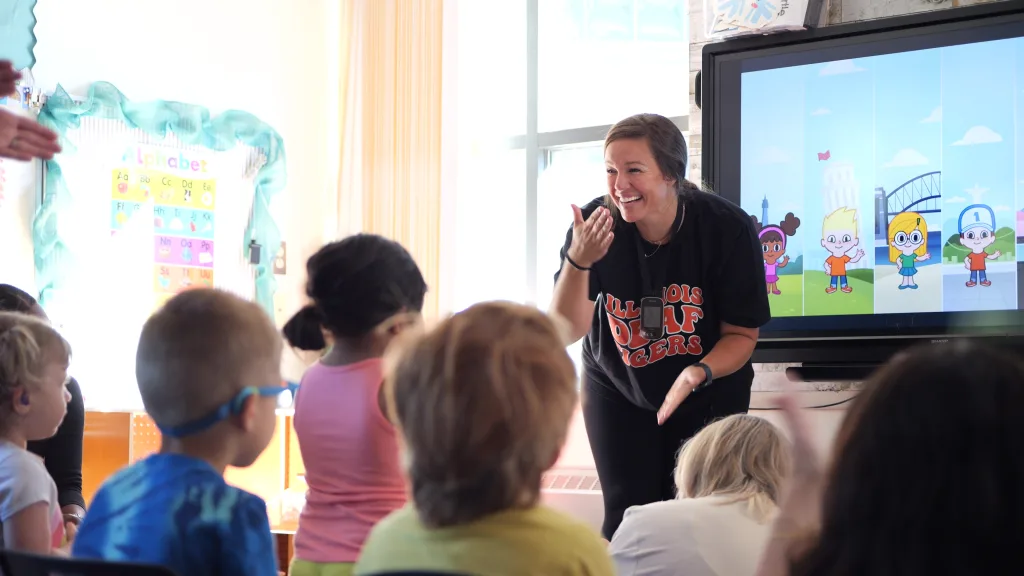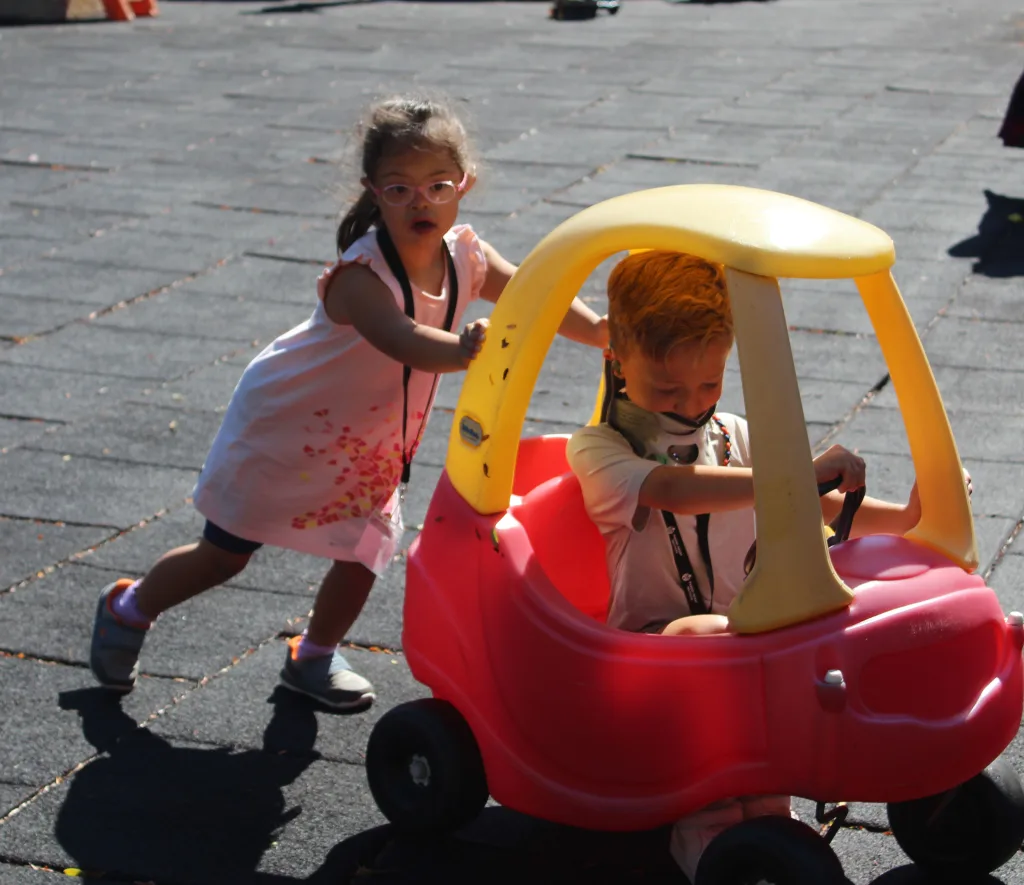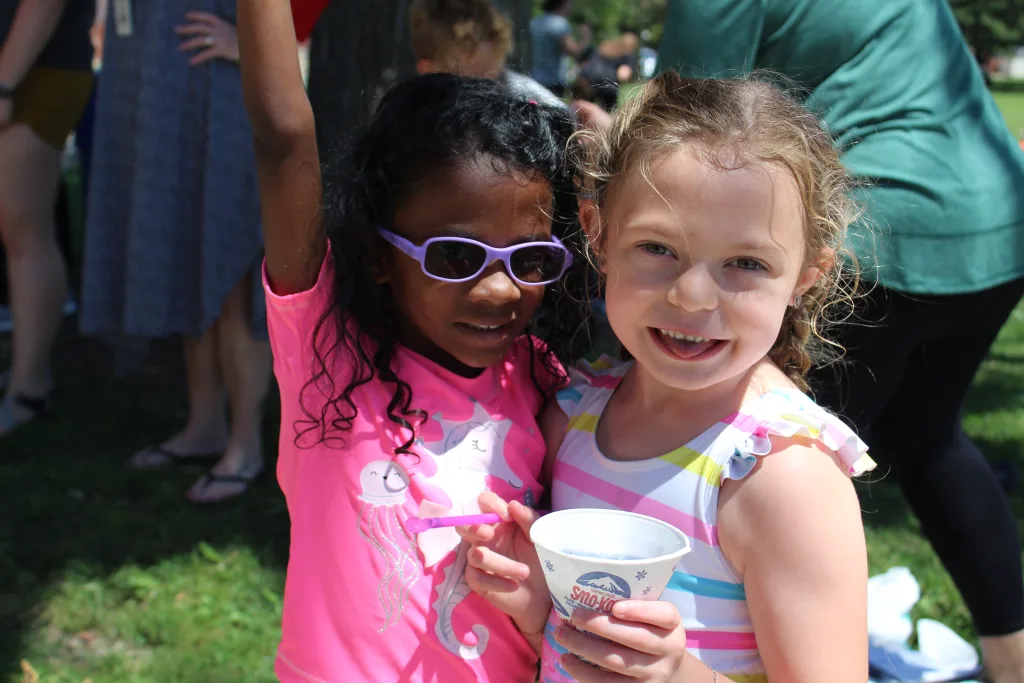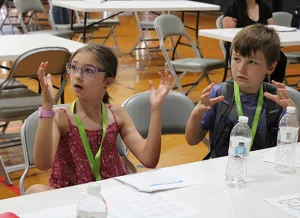Families Gain Expert Guidance and Support Network for Raising Children with Hearing Loss
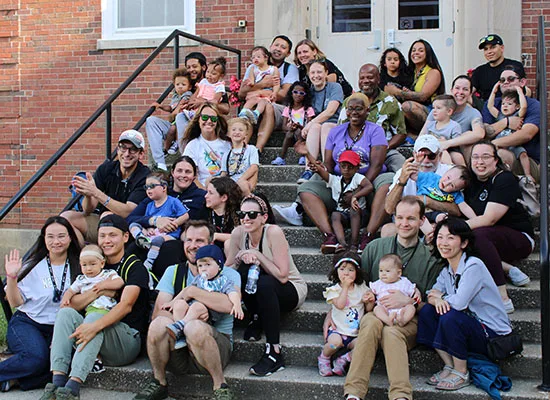
The 2024 Institute for Parents of Preschool Children Who Are Deaf or Hard of Hearing provided education and connection to 27 Illinois families.
Marcellus Weldon and his daughter, Mariana, were born with the same rare genetic disorder called Treacher Collins syndrome.
It affects the development of the head and face, including the ears.
“We don’t have any ear canal or any ear at all, on both sides. So, we’re profound to moderate deaf. It just happens at birth,” Marcellus explained.
He uses the analogy of a car to describe living with their disabilities.
“Growing up, I was the passenger, and my mother was the driver because she also has the same condition as me,” he said.
“Now that I’m the parent, I’m the driver and Mariana is the passenger. And we have to go through hills, valleys, twists and turns together. And there’s going to be things that I just can’t do with her.”
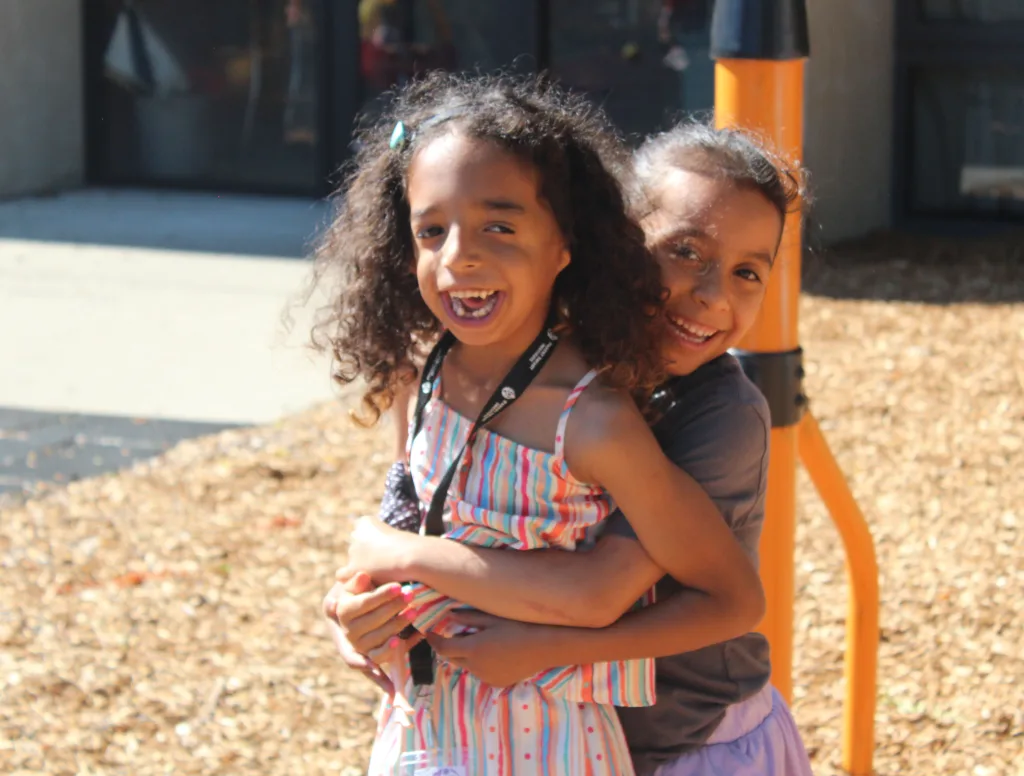
The desire to give Mariana, 6, the knowledge and tools necessary to be her own “driver” led the Weldon family to the 2024 Institute for Parents of Preschool Children Who Are Deaf or Hard of Hearing.
The Institute is a free, annual program for parents and caregivers of children ages 6 and under who have an identified hearing loss. It focuses on helping families find answers, build connections and access resources all in one place.
During the four-day program, Marcellus watched Mariana bond with other children. He also learned more about his family’s type of hearing loss, education options and how to best support Mariana through school and beyond.
“It’s nice for me to see her thrive not only academically but socially, and she’s just been blossoming like no other. And that’s a beautiful thing to see,” he said.
“She has a community. She has somewhere to go,” Marcellus continued. “She has resources that I never had — someone to fill up her tank, using that analogy.”
The Weldons were among 27 families from all over Illinois who attended this year’s Institute from June 13-16 on the Illinois School for the Deaf (ISD) campus in Jacksonville.
The University of Illinois Chicago’s Division of Specialized Care for Children (DSCC) supports the Institute, along with other sponsors.
“Parent Institute for me is exactly the soul and the heart of what DSCC’s mission is. You have our mission statement as partnering, helping and connecting. And this program is the epitome of what that is,” said Violet Wiker, DSCC’s Family Liaison who helps families enroll and prepare for the Institute.
Continue reading and watch the recap video below to for powerful parent and staff testimonials from the 2024 Institute:
Expert advice and guidance
The Institute provides valuable education and networking for children with hearing loss, their parents/caregivers and their siblings.
Participating parents and caregivers attend daily lectures by experts in the field to learn about raising a child with hearing loss. They also meet in small groups with professionals to discuss specific concerns and connect with other caregivers.
“They go through classes, they have educational experiences, they get to make friends that are people that are living their journeys and then interacting with the professionals that can give them great advice and guidance and expertise on how to go forward from here,” Violet said.
The children with hearing loss attend classrooms with experienced teachers of children who are deaf or hard of hearing. They play with one another and often develop deep friendships.
Each child also has the opportunity to receive hearing, vision, psychological, speech, language and educational evaluations.
“All of those are these amazing comprehensive reports that (families) can take with them out into their communities where they need those reports and those recommendations,” Violet said.
Siblings also attend and stay with their families in the ISD dorms. The siblings have their own teachers and take part in fun recreational activities.
“No one ever leaves disappointed and without fail, by the time we depart at the end after the graduation ceremony, people are always very grateful, glad that they came and they have taken away a lot of knowledge and information,” said Angela Kuhn. Angela is an ISD administrator who serves as the director for the Institute.
“They have really a connection with the staff here at the School for the Deaf and DSCC employees that lasts for a lifetime.”
“We understand each other”
Mayra Villarreal attended the Institute looking for knowledge, community and others who would understand her family’s situation.
Mayra’s daughter, Miliani “Mili” Carmona, 6, has a rare genetic mutation that causes progressive hearing loss. It also causes retinitis pigmentosa, a condition that affects the eyes and leads to gradual vision loss, as well as seizures and other neurological problems.
The Institute helped Mayra understand how Mili perceives the world.
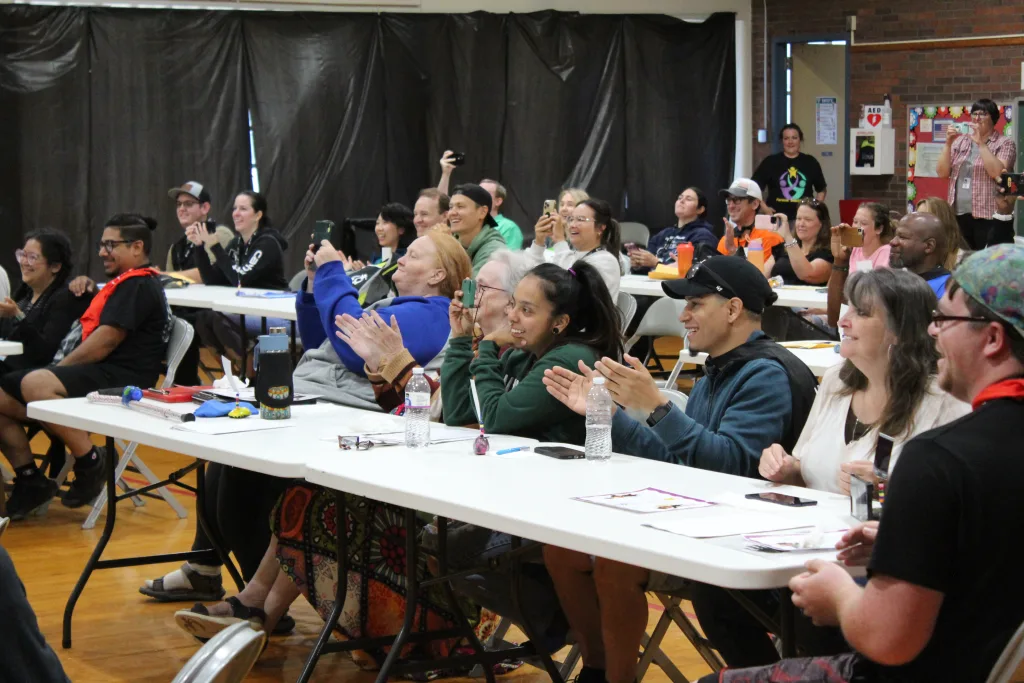
“The first thing that really hit a ‘wow’ moment for me was when we were doing the educational part about the hearing impairment, and they played that hearing loss simulation video. And hearing where she was, it was just surreal because you don’t really get it. You could try all you want to understand what your child’s going through, but you don’t get it unless you’re in it…” she said.
“It broke my heart. But it also made me understand her more… and see why things have been so hard for her.”
Mayra also found understanding for herself from both the Institute staff – many of whom have hearing loss themselves or are related to someone with hearing loss – and the other families.
“Everybody’s connected in some sort of way, and that’s why I feel like everybody here has such a passion for it,” Mayra said. “I’m lucky enough to take back these relationships that I have built with these parents because we might not be on the same journey, but we understand each other.”
Parent Megan Andresen and her 5-year-old son, Victor, are both deaf from Waardenburg syndrome.
“Coming into this I wanted to learn about my son’s behavior. Then I learned about implants and cued speech and different things, and it really opened my eyes.,” she said.
“The thing I think I’ll take away is as parents, whether we’re deaf or hearing, we have that same commonality because we do have deaf children, and it’s not different people in different groups,” she continued.
“It’s everybody really together, all coming here for the betterment of their children and to learn about their children.”
Sarah Dupuis’ daughter, Kimberly Pham, is 5 and was born with Down syndrome and mild to moderate hearing loss. As a special needs parent, Sarah said the opportunity to relate with other families is invaluable.
“Having a kid with special needs is so isolating. And to just be here with other families that face the same struggles… You’re sharing all of these stresses together, and it’s so cathartic,” she said.
Sarah and her husband, James Pham, also enjoyed the opportunity to immerse themselves in the classes and conversations without the distractions of day-to-day life back home.
“When you’re a parent of a child with special needs, you’re so overwhelmed all the time. And we just need resources, and it’s so hard to figure all those resources out by yourself,” Sarah said.
“You can come here, you can get the camaraderie with the other parents. You can learn about all kinds of things that you didn’t know about before. And it’s just so great. So, we’re really grateful for this.”
Inclusion and lifelong friendships
Lauren and Jonathan O’Brien traveled to the Institute with their daughter, Alannah, 7, and son, Josiah, 4.
Josiah has a genetic deletion on chromosome 15, which causes global delays with a bilateral hearing loss.
Alannah loved the sibling program and made a best friend with another girl in her group. Lauren and Jonathan also befriended the child’s parents.
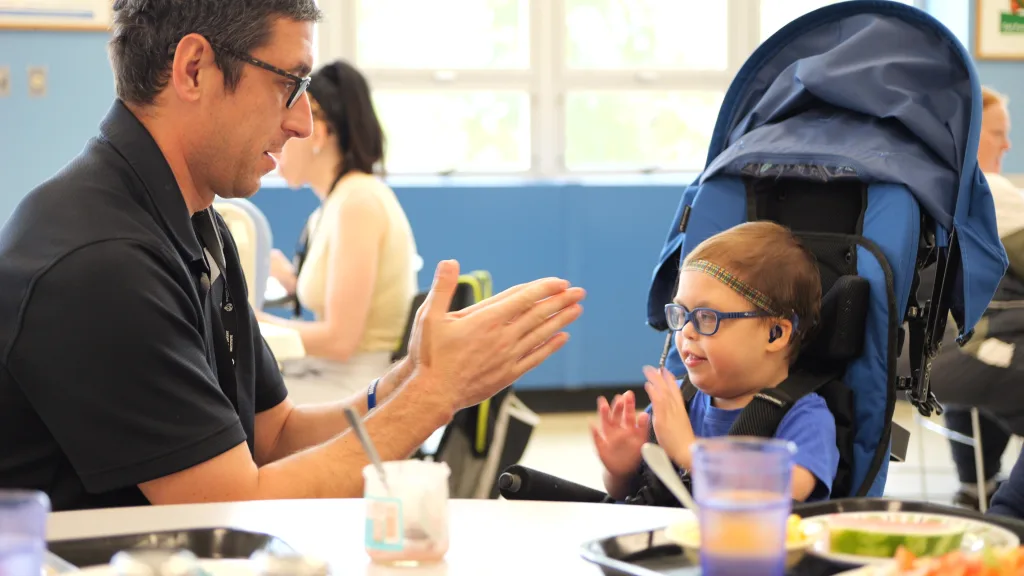
“I think the most important thing was for us to find a community because we are blessed to be in a really good school district with a deaf and hard-of-hearing community. But there’s not always kiddos that also have all their diagnoses going on. And so here, you not only have the Deaf culture, but there were other kiddos that had similarities to him cognitively,” Lauren said.
“It’s just been amazing for us to have the parent side of it and then to know that (Josiah)’s being seen by all of these top specialists in the field. And then (Alannah)’s having the time of her life with other siblings. It’s so special for all of us to be here together and to get this experience.”
Ramie Nauman’s daughter Alivia is 6 and has a fluctuating hearing loss along with other health conditions. They attended the Institute along with Alivia’s big sister, Malley, who is 19 and studying in the deaf and hard of hearing education program at Illinois State University
Alivia is mostly non-verbal and communicates through sign language. Up until attending the Institute, Ramie and Malley were the only ones who signed with Alivia outside of her school.
“She doesn’t have a lot of people to actually talk to all the time. So, we wanted for her to be able to talk to other kids and other adults. And we’ve heard about the school (ISD) and that everybody signs, and so, she’s been super excited,” Ramie said of preparing for the trip to ISD.
Alivia’s excitement only grew once she arrived on campus and could sign with everyone she met.
“I love to see her in her element, talking to the cook and talking to everybody. So, I think that’s been really fun to watch her be able to communicate with everybody here, which she’s never had before,” Ramie said.
“I feel like everything’s just way less scary because she knows, ‘OK, I can talk to anybody,’” Malley added.
Alivia’s Institute classmate Kingslee also benefited from that immediate sense of belonging, his grandmother Constance said.
Back home in the Collinsville area, Kingslee was the only deaf child in his class. Therefore, his exposure to sign language and communicating with other kids was minimal.
During the Institute, Kingslee formed fast friendships and didn’t want to leave his classroom.
“It’s like a family here. Like my grandmother always said, ‘It takes a village to raise a child.’ And I see this here is his village,” Constance said.
To families thinking about attending the Institute next year, Constance has a simple message.
“Come. If this is your state, come,” she said.
Learn more about the Institute
Visit our Facebook page to see an album of photographs from the the 2024 Institute.
In addition to DSCC, the following organizations supported this year’s program:
- Department of Human Services – Division of Rehabilitation Services
- Illinois School for the Deaf
- Illinois State Board of Education
- Illinois Department of Public Health
- Ann & Robert H. Lurie Children’s Hospital of Chicago
For more information about the Institute and how DSCC supports children with hearing loss, call (800) 322-3722 or email dsccinstitute@uic.edu.
Former DSCC Participant Connects Youth with Hearing Loss to Services and Support
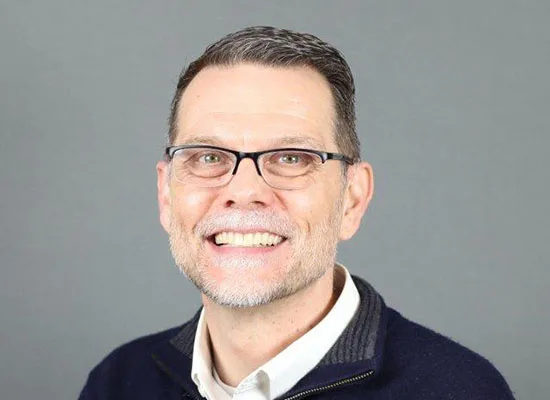
Todd Williams received Division of Specialized Care for Children (DSCC) support growing up and now leads the Evaluation Center at the Illinois School for the Deaf
Todd Williams has come full circle.
Todd, 53, grew up with hearing loss that wasn’t diagnosed until late in his childhood. He enrolled with the University of Illinois Chicago’s Division of Specialized Care for Children (DSCC) and a new world of access opened to him.
That access and support led him to a career that’s opening doors and opportunities for countless other Illinois families of children who are deaf or hard of hearing.
Todd is currently the Evaluation Center Director at the Illinois School for the Deaf (ISD). In this role, he helps school children with hearing impairments all over Illinois receive the right assessment, enrichment and intervention services.
Todd also speaks with parents during the annual Institute for Parents of Preschool Children Who Are Deaf or Hard of Hearing on the ISD campus in Jacksonville each June. The Institute is a partnership of DSCC, the Illinois School for the Deaf and other sponsors. It provides valuable education, resources and connections to families of young children with hearing loss in Illinois.
“My involvement with Parent Institute is just to be an advocate and tell them… ‘I’m a client of this program. So, please take advantage of the services that are out there,’” he said.
“The services don’t just come to you. You have to make an effort.”
Todd explains more about how he helps empower and inspire Institute families in the video below:
Todd says he is thankful for the support his family received when they needed it most.
He was in the sixth grade when his language arts teacher noticed something was “off” and mentioned it to his mother.
“Sometimes you don’t know what you don’t know until you do,” Todd said. “Once my hearing was tested, they couldn’t figure out why I was functioning so well! I remember being able to read lips. Even though I might not hear the bell ring, I could see what the other kids were doing and follow along.”
Todd said his hearing loss was mild to moderate at that time, and school wasn’t a struggle.
He was then diagnosed with bilateral sensorineural hearing loss, a condition where there is damage to the tiny hair cells in the inner ear (known as stereocilia) or to the nerve pathways that lead from your inner ear to the brain.
“We don’t know what caused my hearing loss, but I was sick a lot as a young child with allergies and ear infections,” Todd said. “I must have had hearing at some point because I know what letters and other sounds should sound like, so my speech wasn’t greatly impacted.”
He attended public school during the recession of the 1980s, and money was tight for his family as they started researching how to best support his hearing loss.
“The economic situation was terrible, and probably everybody in town was getting or needed some sort of assistance,” Todd explained.
His mom attended a town meeting about available services, and a woman told her about DSCC.
“That was back when DSCC was called the Division of Services for Crippled Children,” Todd said. “Thankfully, the name has changed, inclusion is growing, and the woman impressed on my mom that DSCC could help.”
For 87 years, DSCC has partnered with Illinois families to help connect children with special healthcare needs – including hearing loss – to the services and resources necessary to reach their full potential.
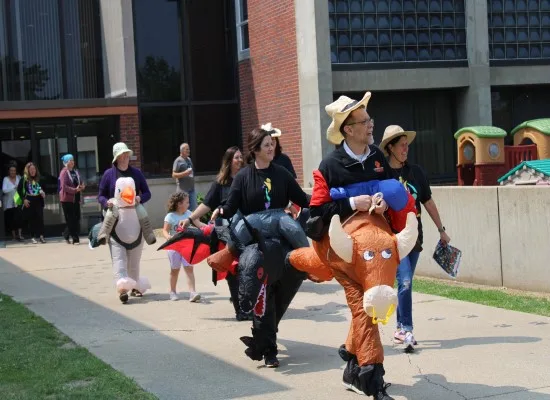
Thanks to DSCC, Todd began to see audiologists and providers who could help. He also received financial support for the cost of his first hearing aid. (DSCC can provide financial assistance for some eligible medical expenses when families meet certain income guidelines.)
“Having my hearing aid was access. We would have found the money somewhere, but it would have been an incredible hardship,” Todd said. “It was no coincidence that things fell in line. With DSCC it was amazing, perfect timing. That’s the beauty of it.”
Later, when his family moved, DSCC went with them.
“No matter where you go in Illinois, DSCC is there,” Todd said. “They were there to help my family with appointments and hearing aids. I got a second hearing aid when I was a sophomore and getting closer to aging out of the program.”
Todd later started planning for college. He took a placement test at John A. Logan Community College in Carterville. While there, a gentleman saw his hearing aids and gave him contact information for the Division of Rehabilitation Services (DRS or DORS) program.
“DORS helps individuals with disabilities become independent, productive citizens. They helped me through school, and I got my master’s at no cost,” Todd said.
He attended Illinois State University and earned a bachelor’s degree in teaching deaf and hard-of-hearing students. He later earned his master’s degree in counseling as well.
Over the years, Todd has worked in education and counseling and served as a deaf/hard of hearing consultant for the state. He also progressed from being hard of hearing to deaf. Todd now has cochlear implants, which unlocked a new world of sounds for him.
He became ISD’s Evaluation Center Director in December 2020. He says he enjoys empowering families and serving as a role model for youth with hearing loss.
“I had a little kid come up to me in the dining hall who was all excited because I had two implants just like him,” Todd said. “So, there’s the role model part, too, which is important for our kids to see that adults do walk around with these (implants), and they are successful.”
Todd encourages families of young children with hearing loss to attend the Institute and learn how ISD, DSCC and other state programs can benefit their children and families.
“Don’t miss out on a chance when you can really gain the most comprehensive evaluation for your child, and the resource list will be phenomenal,” Todd said.
“You have the ability to ask questions, to get questions answered that maybe you’re not feeling comfortable with asking in another setting. That’s what we’re here for. We’re here to answer questions and become a resource for you so the programing for your child can be the best that it can be. That’s our goal.”
Institute Provides Education, Support and Connection for Families of Children with Hearing Loss
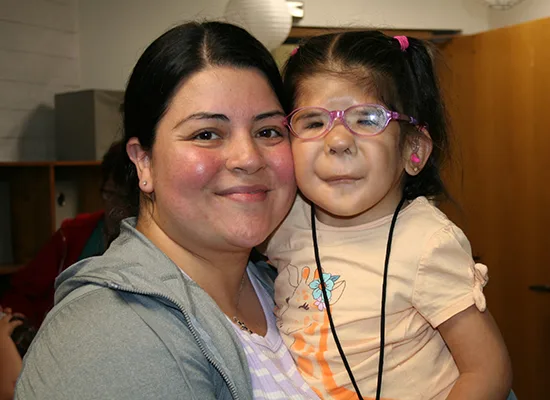
Illinois families gained knowledge and formed priceless relationships during the 2023 Institute for Parents of Preschool Children Who Are Deaf or Hard of Hearing.
The journey to the 2023 Institute for Parents of Preschool Children Who Are Deaf or Hard of Hearing was a mixture of excitement, nerves and some fear for Kelly Lane and Crystal Harris.
When they received the flyer for the free one-week program at the Illinois School for the Deaf in Jacksonville, they were skeptical it would be the right fit for their son, Casper.
Casper, 4, has bilateral hearing loss, epilepsy and a developmental delay.
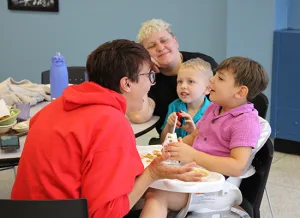
“We’ve been to other events on a smaller scale before that were geared towards families with kids who have hearing loss and felt out of place there because our son also has other disabilities,” Kelly said.
Crystal called the number on the flyer and spoke with Violet Wiker, the Family Liaison for the University of Illinois Chicago’s Division of Specialized Care for Children. Violet helps families enroll in the Institute and addresses any questions or concerns they may have.
Crystal said she talked to Violet for more than two hours.
“She assured me that there were kids of all different learning abilities here, that they would be in a classroom setting… she really sold it to me, really made me feel comfortable,” Crystal said.
She and Kelly then made the trip from Chicago with Casper and his big brother, Courtland. Once they arrived on the School for the Deaf campus, they knew they made the right choice.
“We couldn’t have felt more welcome… We’re used to feeling out of place, so it felt really good to come somewhere and feel normal for once,” Kelly said. “Coming here just felt like going home.”
A total of 22 families from across the state attended this year’s Institute from June 11-16. The Institute is for Illinois parents of children from birth to age 7 who have a significant hearing loss.
Participating parents attend daily lectures by experts in the field to learn about raising a child with hearing loss. Lecture topics include:
- Child development
- Types of hearing loss
- Language development
- Communication choices
- Assistive communication devices
- Deaf culture
- School programming
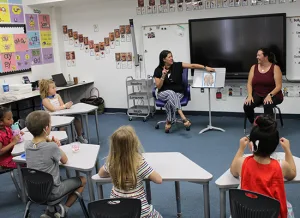
Other activities include meeting in small groups to discuss specific concerns and connecting with other caregivers.
The children with hearing loss attend classrooms based on their age group. Experienced teachers and aides for children who are deaf or hard of hearing oversee these classrooms.
Attending children also can receive hearing, vision, psychological, speech, language and educational evaluations. They also get to play with other children who have a hearing loss.
Siblings also attend the Institute and participate in fun and educational activities, including art projects and learning to sign.
There is no cost for families to participate in the Institute. Meals and housing are provided at no charge.
“One place, all questions answered”
Laura Colic’s son Liam is almost 5 and profoundly deaf. He wears bilateral cochlear implants that he’s had for a little over a year.
“I just wanted to get as much information to make sure that we give him all the opportunities, especially since he’s starting kindergarten in the fall,” Laura said of her decision to attend.
One of her favorite experiences from the week was listening to a panel of Deaf adults share their experiences.
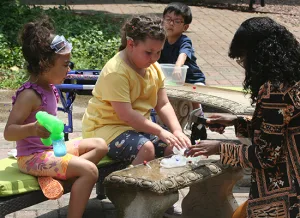
“When you’re in it with little ones, it’s hard to see what that may look like as they grow up. I love the exposure to just the Deaf culture. Even Liam has loved that. He has been so excited to see adults with cochlear implants” she said.
Laura also praised the knowledge of the team of professionals who spoke with families and provided evaluations for the children.
“Their knowledge is phenomenal, and I feel like it’s golden,” she said.
“I wish I could take them with me back home and just create this bubble for Liam. But I’m happy to take the knowledge that they’ve given me, the assessments they’ve provided, the one-to-one time with each of the different people that have worked with Liam and assessed Liam. The evaluations are just phenomenal.”
Sylvia Gavina is mom to 4-year-old Freddy. She appreciated the opportunity to see and understand what Freddy’s hearing loss truly means for him.
“Being able to meet with the professionals and learn what we did in a week takes it to a different level. At home, you might have an appointment one week and then wait three months for the next one. Here, we are leaving with a baseline. One place, all questions answered,” she said.
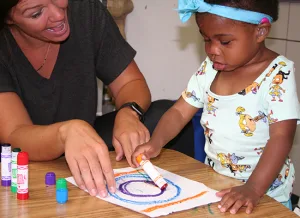
Sheryl Stone’s daughter Nevaeh is 4 ½ and attends the Illinois School for the Deaf. She said the Institute gave her an eye-opening look into how Nevaeh experiences the world. An education session on the Deaf experience helped her understand better what it’s like to not hear and to rely on lip-reading, sign language and other communication methods.
Eddi Fowler said she also learned how to better communicate with her 2 ½-year-old daughter, Kacey. In addition to learning American Sign Language (ASL) and cued speech, Eddi learned more about available resources and how to advocate for Kacey.
“I learned a lot, and I have a lot to take back home with me. I’ve got gigantic paperwork that’s going to help Kacey and my little family throughout the year with her education needs, her hearing loss, her autism, everything,” Eddi said.
“A community of families”
Three-year-old Christian has hearing loss in both of his ears. His parents Basia and Aaron said watching their son become more social with the other children was especially rewarding.
“He’s more expressive. With all the signing and the cued speech that we’re integrating, he’s using his hands more, different modes of communication. That’s something that we were really trying hard to get out of him at home and it’s been tough. But he seemed to really just open up to more people and other children as well,” Aaron said.
Sarah Berns attended the Institute with her son, Colsen, and daughter, Evelyn. Colsen, 7, was born with bilateral sensorineural hearing loss. However, his family was not aware of his hearing loss until he was 3 years old.
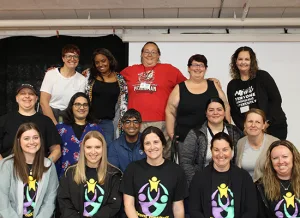
The Institute was the first time he could see other kids with hearing aids and cochlear implants and simply play with them and have fun.
Sarah said she also found a special connection with the other parents.
“I felt like I was all alone. And now I feel like I have a community of families that I can call when I need to talk to them about anything. I also got a lot of information about what my son is going through and what it’s like to be hearing impaired, which is the best connection that I could have with my son, and knowing more about him and what he needs,” she said.
The Institute was also just as valuable for Colsen’s big sister Evelyn.
“She sees that (hearing loss) isn’t something that’s terrible, her brother isn’t annoying, and that there’s this really cool language now that we can have between us that she wasn’t interested in before,” Sarah said. “There’s value in it for her… she has a newfound empathy that she didn’t have before.”
Sarah encourages all families of children with hearing loss to make the trip to the Institute.
“It is life-changing. There are people that value you for who you are, and they are only here to help and give you strategies to help you,” she said.
“A sense of comfort”
After spending a week at the Institute, Kelly and Crystal said they didn’t want to leave.
“We’re not ready to go home. This past week, I’ve felt a sense of comfort that I haven’t felt in a very long time,” Crystal said.
“And that’s saying a lot considering how much information overload has been happening,” Kelly added. “I feel like we should be feeling frazzled and overwhelmed with the amount of new information we’ve gotten, but instead I just feel clarity. I feel clear on where my son’s at, where we need to go, and the options that we have and resources that we have at our disposal.”
Sarah shared a similar sense of peace and optimism for her son, Colsen, after attending the Institute.
“Even though life is not the same plan I thought it was going to be, it’s still going to be wonderful…” she said. “Seeing these other people going through this and through their life, how their life has been impacted by having hearing loss, I realize that (Colsen) really hasn’t lost anything. He is just experiencing it in a different way, and that that’s OK, and that we’re going to be OK.”
Visit our Facebook page to see a photo album with more photos from this year’s program. You can also see videos that highlight different parts of the Institute experience on our YouTube playlist.
The following organizations supported the 2023 Institute:
- University of Illinois Chicago’s Division of Specialized Care for Children (DSCC)
- Department of Human Services – Division of Rehabilitation Services
- Illinois School for the Deaf
- Illinois State Board of Education
- Illinois Department of Public Health
- Ann & Robert H. Lurie Children’s Hospital of Chicago
The 2024 Institute will take place June 13-16. Please see the below flyers for more details:
For more information about the Institute and how DSCC supports children with hearing loss, call (800) 322-3722 or email dsccinstitute@uic.edu.
2020 Parent Institute Canceled
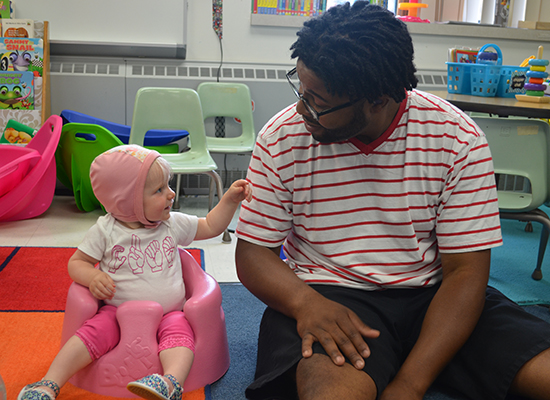
The Institute for Parents of Preschool Children Who are Deaf or Hard of Hearing is canceled due to the COVID-19 pandemic.
We are sorry to announce that this year’s Institute for Parents of Preschool Children Who are Deaf or Hard of Hearing is canceled.
This decision follows the Governor’s executive orders to keep schools closed, keep people home, maintain social distancing and promote public health during the coronavirus (COVID-19) pandemic.
The Institute is a one-week program for parents of children ages 5 and under who have a significant hearing loss. It takes place on the campus of the Illinois School for the Deaf in Jacksonville each June.
Participating parents attend daily lectures by experts in the field to learn about raising a child with hearing loss.
Although we cannot gather in person, parents can still access presentations from the Institute’s experts.
As a supporter of the Institute, the University of Illinois at Chicago’s Division of Specialized Care for Children (DSCC) has made these presentations available online so they can benefit more families of children with hearing loss.
Videos on each topic are posted on the Illinois Sound Beginnings website.
Parents and caregivers can watch each presentation at their own pace in the comfort of their own home.
We will announce details for next year’s Institute after organizers determine a date.
If you would like more information about the Institute, call us at (800) 322-3722 or email Institute@exchange.dscc.uic.edu.
Parent Institute Lectures Available for Families of Children With Hearing Loss
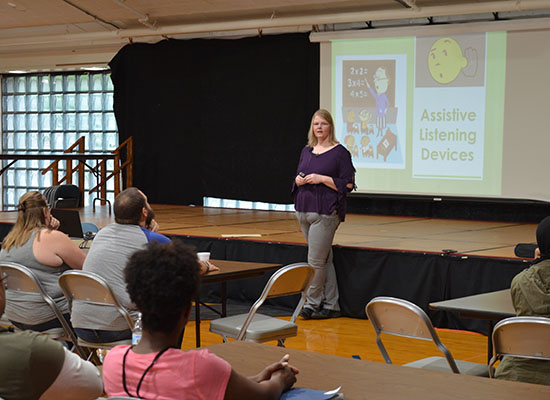
Families can watch video presentations from experts in the field on a range of topics affecting children who are deaf or hard of hearing.
The Institute for Parents of Preschool Children Who Are Deaf or Hard of Hearing is a one-week program for parents of children ages 5 and under who have a significant hearing loss.
It takes place on the campus of the Illinois School for the Deaf in Jacksonville each June. Participating parents attend daily lectures by experts in the field to learn about raising a child with hearing loss.
Lecture topics include:
- Individuals With Disabilities Education Act (IDEA)
- Advocacy
- Communication Options
- Language
- Assistive Listening Devices
- Literacy
- Amplification
The University of Illinois at Chicago’s Division of Specialized Care for Children (DSCC), a supporter of the Institute, is making these presentations available online so they can benefit more families of children with hearing loss.
Videos on each topic are posted on the Illinois Sound Beginnings website.
Parents and caregivers can watch each presentation at their own pace in the comfort of their own home.
If you are interested in participating in the next Institute or would like more information, call us at (800) 322-3722 or email Institute@exchange.dscc.uic.edu.
You can also visit our Events page for more details about the 2020 Institute.
You may also read a recap of the 2019 Institute at https://dscc.uic.edu/institute-provides-support-connection-for-dscc-families-of-children-with-hearing-loss/.
Institute Provides Support, Connection for DSCC Families of Children With Hearing Loss
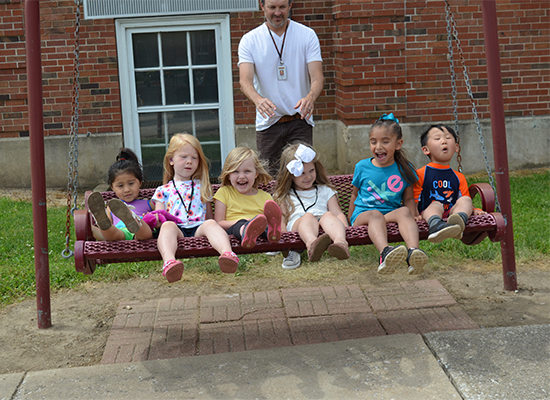
Families gain knowledge, resources and friendships during the 2019 Institute for Parents of Preschool Children who are Deaf or Hard of Hearing.
When Leticia Hubart learned about the Institute for Parents of Preschool Children Who Are Deaf or Hard of Hearing, she knew she must attend.
Her 4-year-old son, Liam, was just diagnosed with hearing loss in December after showing behavioral issues.
“Hearing loss was not on my radar. I dove right into educating myself,” she said.
Leticia, Liam and his big sister, Teagen, traveled from Rock Island to the Illinois School for the Deaf campus in Jacksonville to attend the Institute. They joined 33 other families from across the state for the weeklong program from June 9-14.
“It’s changed my world,” Leticia said of the experience. “It opened my eyes to the diversity of hearing loss. It’s not a doom-and-gloom kind of diagnosis. He’s going to be OK, and I’m going to be the best advocate I can be for him.”
The Institute provides support and valuable information on communication options, language development, amplification, social-emotional development and school programs. There is no cost to participating families.
A common link
UIC’s Division of Specialized Care for Children (DSCC) supports the Institute, along with other sponsors.
This year’s Institute was the largest on record, with 34 participant children enrolled and a total of 119 people attending from 31 families.
Participating parents attend daily lectures by experts in the field to learn about raising a child with hearing loss. Lecture topics include:
- Child development
- Types of hearing loss
- Language development
- Communication choices
- Assistive communication devices
- Deaf culture
- School programming
Other activities include meeting in small groups to discuss specific concerns and connecting with other caregivers. Parents are also able to have a night out together without their children.
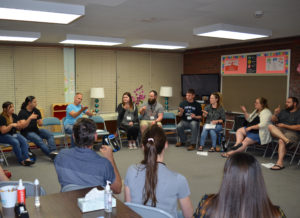
An American Sign Language instructor teaches parents during the 2019 Institute for Parents of Preschool Children Who Are Deaf or Hard of Hearing.
During the Institute, children attend classrooms based on their age group. Experienced teachers of children who are deaf or hard of hearing oversee these classrooms.
Attending children have the opportunity to receive hearing, vision, psychological, speech, language and educational evaluations as well as play with other children who have a hearing loss.
Their siblings are also welcome to attend and participate in fun and educational activities, including art projects and learning to sign. This year’s sibling program had 30 children.
There is no cost for families to participate, and meals and housing are provided at no charge.
“I am very delighted that one common link that each of these families share is that each one of them is a DSCC family. I am so thankful to our DSCC staff for the extra work that was involved in getting each of these families ready for this weeklong experience,” DSCC Family Liaison Violet Wiker said.
A community ready to help
T.J. and Brianna Taylor of Macomb attended the Institute with their 11-month-old daughter, Larkin.
Larkin’s newborn hearing screenings were positive, suggesting she may have a problem hearing. She then underwent an Auditory Brainstem Response (ABR) test. She was diagnosed with bilateral sensorineural hearing loss and enrolled with DSCC and Early Intervention.
“She’s been in her element. She loves watching people sign,” T.J. said, noting Larkin has already mastered several basic signs herself.
The Taylors want to let Larkin choose her communication form and her assistive device as she gets older. T.J. said it’s been valuable for the couple to hear so many positive stories about different options.
Brianna said she also values the connection with other families.
“We all have different journeys but it’s nice to be able to relate to those different stories,” she said.
Lynsey Runyon attended with her 4-year-old son, Branson. She said she was impressed with the amount of information available during Institute.
Years of problems passed before Branson’s hearing loss was diagnosed in spring 2018. A few months later, Lynsey moved her family to Jacksonville so Branson could attend the Illinois School for the Deaf late last fall.
Lynsey said she often feels she is trying to play catch-up with learning about the world of hearing loss. She appreciated the Institute’s more in-depth lectures and workshops to explain topics in ways she could easily understand.
“I only wish we would have found out about this sooner,” she said.
Many of the attendees encouraged other parents to consider the Institute.
“Don’t be afraid to ask for help because you have a community that’s ready to be there and help you,” Leticia Hubart said. “Don’t’ be afraid to advocate for your child.”
Visit our Facebook page for photos from this year’s Institute.
For more information about the Institute for Parents of Preschool Children Who Are Deaf or Hard of Hearing and how DSCC supports children with hearing loss, call (800) 322-3722 or email dscc@uic.edu.
Visit our Facebook page for photos from this year’s Institute.
The following organizations supported the 2019 Institute:
- University of Illinois at Chicago’s Division of Specialized Care for Children (DSCC)
- Department of Human Services (DHS) Division of Rehabilitation Services (DRS)
- Illinois School for the Deaf (ISD)
- Illinois State Board of Education (ISBE)
- Department of Public Health (DPH)
- Ann & Robert H. Lurie Children’s Hospital of Chicago
DSCC Families Connect, Find Support for Children with Hearing Loss During Annual Institute
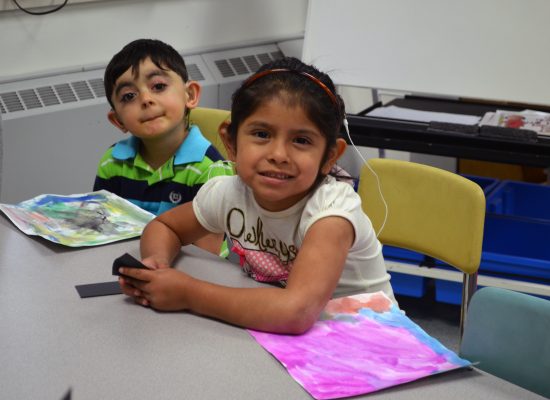
Families gain valuable information and confidence during the 2018 Institute for Parents of Preschool Children who are Deaf or Hard of Hearing.
Late last year, Kendall and Nick Gould’s infant daughter, Tate, was born with a hearing loss in both ears. The Chicago couple immediately wanted to learn as much as possible to be effective advocates for their daughter.
A few months later, the Goulds packed up Tate and her big sister, Elle, to travel to Jacksonville for the Institute for Parents of Preschool Children Who are Deaf or Hard of Hearing. They were among 23 families from around the state who attended the free one-week program at the Illinois School for the Deaf campus from June 10-15.
“It’s a terrific opportunity to learn a broad array of perspectives,” Nick said.
The couple enjoyed listening to the experiences of other parents as well as professionals with a hearing loss themselves.
“I’m learning a lot and being instilled with confidence as a parent to know we’re doing the right thing,” Kendall said.
The Institute provides support and valuable information on communication options, language development, amplification, social-emotional development and school programs.
“A great experience”
Participating parents attend daily lectures by experts in the field to learn about raising a child with hearing loss. Lecture topics include child development, types of hearing loss, language development, communication choices, deaf culture and school programming. Other activities include meeting in small groups to discuss specific concerns and connecting with other caregivers.
During the Institute, children attend classrooms overseen by experienced teachers of children who are deaf or hard of hearing. They have the opportunity to receive hearing, vision, psychological, speech, language and educational evaluations as well as play with other children who have a hearing loss.
Their siblings are also welcome to attend. This year’s sibling program had 15 children.
There is no cost for families to participate, and meals and housing are provided at no charge.
UIC’s Division of Specialized Care for Children (DSCC) supports the Institute, along with other sponsors. DSCC Care Coordinators and other team members work hard to help eligible families enroll in the Institute.
Tiffany Farrer attended the Institute with her 2-year-old daughter, Jane, who has a hearing loss in both ears. Their family had just moved to Quincy from South Dakota on May 31.
Tiffany had learned about the Institute on the internet and thought it could be helpful to introduce her family to services and providers near their new home. She explained that her family didn’t yet have an Illinois doctor or audiologist for Jane.
Springfield DSCC Care Coordinator Daniel Porter immediately contacted the Farrers and traveled to their home on June 5. He helped the family fill out the applications and submit all necessary paperwork to enroll with DSCC. Daniel also assured the family he would help find the right providers within their insurance coverage.
The following day, Jane was enrolled as a DSCC participant and accepted for the Institute.
“Daniel took care of everything,” Tiffany said.
While at the Institute, Tiffany said she enjoyed learning more sign language to give her daughter more communications options.
“It’s a great experience, I’m happy to be here,” she said.
“Thankful for the friendships”
Andrea Stambaugh attended the Institute with her 2-year-old son, Axel Johnson. Axel has bilateral hearing loss and cochlear implants in both ears.
Andrea is active with Illinois Guide by Your Side and heard one of the program’s parent guides speak highly of the Institute. She wanted to be able to learn more about resources and develop relationships with other families who have children with a hearing loss.
“I’ve liked meeting the other families, and it’s been good for Axel to see other deaf children and adults,” Andrea said.
DSCC Family Liaison Violet Wiker said these special connections and conversations are what the Institute is all about.
“These families are so appreciative that they have the opportunity to learn from so many different professionals. They are even more thankful for the friendships they are forming,” she said.
For more information about the Institute for Parents of Preschool Children Who are Deaf or Hard of Hearing and how DSCC can support children with hearing loss, call (800) 322-3722 or email dscc@uic.edu.
Visit DSCC’s Facebook page for photos from this year’s Institute.
- The condition in this story is covered by Specialized Care for Children



